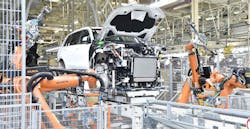BMW AG will keep spreading the gospel of free trade and back its rhetoric up by investing more in its massive U.S. plant, all as the Trump administration mulls higher tariffs on imported autos.
The German automaker is presenting two SUVs at the Los Angeles auto show this week: a refreshed X5 crossover and a new three-row model, the X7, that’s BMW’s biggest sport utility vehicle ever. Both will be made in the company’s factory in South Carolina, Chief Executive Officer Harald Krueger said in a Bloomberg Television interview.
“Our strategy is quite clear: We are producing the products in the main markets, and the main market for the X7 is the U.S.,” he said. “Our business model is based on free trade across the globe, which definitely helps in creating wealth.”
BMW is considering building engine and transmission plants in the U.S., he later told reporters, without providing any details. The company has weighed such a move in the past.
Krueger is trying to navigate trade wars waged by U.S. President Donald Trump and the possibility of a chaotic Brexit, all of which has hampered supply chains for a company that depends on the free flow of goods across borders. BMW’s return on sales from automaking almost halved in the third quarter, and the company cited impact from tariffs as well as pricing pressure.
Higher vehicle levies will take a 300 million-euro (US$339 million) bite out of 2018 earnings, Chief Financial Officer Nicolas Peter said earlier this month. The China-U.S. trade spat alone is likely to cost the company 600 million euros a year on X models.
BMW’s Spartanburg, South Carolina, plant is its largest worldwide, employing almost 10,000 people. The factory could end up functioning as a shield for the German automaker against Trump’s broadsides at foreign car companies he’s criticized for importing vehicles into U.S.
Spartanburg exported almost 70% of production in 2017, Krueger said. It makes the X3, X4, X5 and X6 SUVs and is slated to add the X7 model in December. Krueger told reporters the facility will be at full capacity next year, when he expects record output of more than 400,000 vehicles and the addition of about 500 more workers.
In the interview, Krueger said he’s increasing output in China because of stronger demand for models like the X3, not because of the trade war between the U.S. and China.
Rising trade tensions “will not hurt Spartanburg as long as we see good demand on the SUV side,” he said.
BMW shares advanced 0.5% as of 9:11 a.m. in Frankfurt. They have declined 15% this year.
By Gabrielle Coppola and Oliver Sachgau
About the Author
Bloomberg
Licensed content from Bloomberg, copyright 2016.
